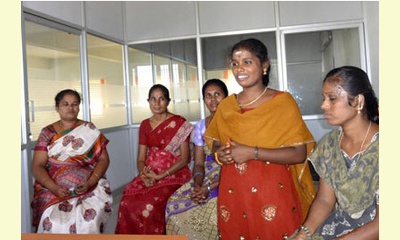|
|
In India’s garment factories, stitching clothes and a culture of non-violence
un articulo por UN Women
A UN Trust Fund-supported project to reduce workplace sexual
harassment is training thousands of workers in 24 factories in India
and Bangladesh, through peer-to-peer education. 
Through the training sessions, women learn to discuss issues of violence and harassment more openly with supervisors and one another. Photo courtesy of Fair Wear Foundation
click on photo to enlarge
Viyakula Mary was born in the southern Indian state of Tamil Nadu.
She was first drawn to the issue of violence against women at the
age of 16, when she heard that a member of her community had
faced sexual harassment but had no prospect of justice.
Mary, now 39, works as a trainer for Social Awareness and Voluntary
Education, a human rights organization based in Tirupur, a city in
Tamil Nadu. She leads training sessions in six garment factories
across the state aimed at reducing workplace sexual harassment.
Her NGO is part of an innovative project focused on the garment
supply chain that is led by Netherlands-based NGO Fair Wear
Foundation, in partnership with garment factories in India and
Bangladesh, European clothing brands, governments, civil society
organizations and trade unions in Europe and Asia.
According to studies by Fair Wear Foundation, violence against
women is widespread in India’s garment factories. Violence ranges
from verbal and physical abuse to sexual harassment and rape.
In the past, as was the case with violence in other social spheres,
women were reluctant to report abuse. Mary says that in the
factories where she has worked, very few effective mechanisms
exist for women workers to report any kind of grievance. Women
who faced violence also have so little faith in either the police or
judicial systems that if a problem persisted, rather than pursue
justice, they would simply look for alternative work.
In 2013, a new law, the Sexual Harassment of Women at Workplace
Act, strengthened the legal protection afforded to women working
in garment factories in India. To ensure the law is being
implemented, Mary believes a holistic approach, including
awareness and training, is needed.
As part of the initiative, the ‘Preventing Workplace Violence’ project,
which is supported by the UN Trust Fund to End Violence against
Women, 3,500 workers in India and Bangladesh have received direct
training in 24 factories, while another 15,000 workers have been
trained via peer-to-peer education.
The training sessions range from three to six hours and are open to
all workers, women and men, as well as management and
supervisors. They’re conducted during working hours and
participants earn at least minimum wages during that time.
“Management now takes quick action when a complaint is brought
to them. In the past they would not even know what we were going
through,” says a 31-year-old female factory worker in Tirupur.
After receiving initial training, workers are nominated to join the
management and NGO representatives as part of a newly-
established ‘Anti-Harassment Committees’. They meet monthly to
address harassment cases. This group receives further training in
communication and listening, problem-solving and decision-
making to help resolve cases.
(This article is continued in the discussionboard)
|








|
DISCUSSION
No hay pregunta ligada a este article.
* * * * *
Comentario más reciente:
:
(The following is continued from the main article listed above.)
According to Juliette Li, a coordinator with Fair Wear Foundation, “lots of women accept sexual harassment because they don’t recognize it as such. And if they do, the factory manager doesn’t take it seriously. We want to create an atmosphere in which workers can talk to their bosses.”
The project, which started two years ago, is showing initial results. The Anti-Harassment Committees established in the factories where Mary works hear approximately four reports a month. The initiative has lifted the lid on a problem rarely spoken about and empowered workers to also address other issues including workplace discrimination and labour rights.
By participating in anti-harassment committees, women have become more vocal on the factory floor. Whereas no women held supervisory positions in any of the six factories at the beginning of the project, five women have since been promoted to such roles.
“We are empowering women more and they are getting knowledge of all these related issues,” says Mary. “We could see after the trainings that the position of women is changing.”
[Thank you to Janet Hudgins, the CPNN reporter for this article.]

|
|









